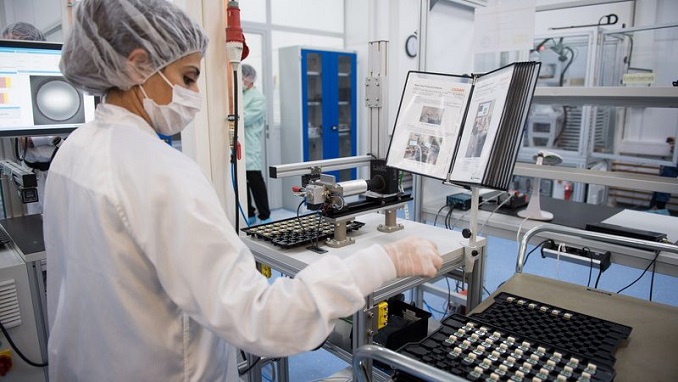Maintaining biotechnology superiority is essential to the U.S. economy and national security, and it must be supported with strategic federal funding that leans into America’s strengths by encouraging private investment, according to a three-year-long Congressional study.
“From more productive seeds and targeted cancer therapies to the possibility of genetically enhanced soldiers, biotechnology’s reach extends far beyond the laboratory,” says the report from the National Security Commission on Emerging Biotechnology (NSCEB), released April 8. “Falling further behind would signal a global power shift toward China and create an array of new strategic challenges for the U.S. government.”
Established with bipartisan support as part of the 2022 defense budget, the NSCEB was tasked by Congress with conducting “a comprehensive review of emerging biotechnology’s impact on national security and provide practical recommendations to preserve American dominance in this field.”
The Commission includes two senators and two House members from each party, and leaders from industry, academia, and the government.
The Biotechnology Innovation Organization (BIO) underlined the importance of the report.
“The NSCEB final report makes clear that without immediate and bold action, the U.S. will cede its dominance in biotech to China in the next few years. This cannot happen,” said BIO President and CEO John F. Crowley. “The report provides us with a roadmap to unlock private investment in biotechnology and protect the health and security of the American people for generations to come.”
At the AI+ Biotechnology Summit, an April 10 event in Washington that put a focus on the NSCEB report, Crowley discussed the importance of the report, and biotechnolgy, for everyone.
“You need to care for the public health. You need to care about biotechnology as an engine of economic growth. And, as this report so well highlights, as a matter of national security,” Crowley told a panel at the event. He explained that national security includes securing public health as well as maintaining biotech leadership and being able to defend against potential threats.
Why China’s biotech spending matters
“The United States is locked in a great-power competition with China that will define the coming century,” the report says. “Unlike the great-power struggles of the past, this one is playing out less through arms races, land grabs, and proxy warfare than through the quest to dominate cutting-edge technology. Biotechnology, the design and engineering of biological systems, is the next battlefield of this great-power competition.”
In the competition over semiconductors, the U.S. was already behind when it started to act. With biotech, America is still leading the competition, though that lead is tenuous.
“China’s recent success across core biotechnology capabilities, including AI-driven drug discovery platforms and biomanufacturing, signals that they may soon eclipse us. And if that happens, the United States may never be able to catch up,” the report says.
As the report explains, China is pursuing its stated goal of achieving global biotechnology dominance with “a 400-fold increase in biopharma R&D spending, over the past decade.”
China’s investments are paying off, as state-supported companies develop the ability to make discoveries and scale them up quickly. Meanwhile, China is using legal and illicit means to obtain intellectual property (IP) and put that IP to work.
AI has accelerated the pace of progress, the report notes, pointing out that tools like AlphaFold from Google’s DeepMind, scientists have predicted hundreds of millions of intricate 3D protein structures,
“With AI, along with gene editing tools like CRISPR, scientists will soon be able to create materials from scratch, prevent illnesses at the level of genetic code, and develop more resilient crops and livestock,” the report says.
Recommendations
“The Commission’s main recommendation is this: the U.S. government should dedicate a minimum of $15 billion over the next five years to unleash more private capital into our national biotechnology sector. Any smaller amount risks hamstringing U.S. innovation and product development,” the report says.
Other recommendations in the report:
Prioritize biotechnology at the national level: China made biotechnology a strategic priority 20 years ago, but “the U.S. government’s approach has been piecemeal and uncoordinated.” We need high-level federal leadership to guide our national biotechnology strategy.
Mobilize the private sector to get U.S. products to scale: China uses government subsidies, but America’s strong private markets are the country’s core advantage. We need to leverage our private markets with streamlined regulations and improved incentives.
Maximize the benefits of biotechnology for defense: “While biology represents a paradigm shift in warfare, the Department of Defense (DOD) is not deploying biotechnology-enabled capabilities, leaving our military vulnerable,” the report says. “We must develop these technologies in line with American values before the CCP advances them without ethical constraints.”
Out-innovate our strategic competitors: We must treat our data as a geopolitical asset the way China does. We must ensure researchers have the best tools, and we must emphasize safe, secure, and responsible research in line with American values.
Build the biotechnology workforce of the future: “Federal departments and agencies must ensure that their employees are appropriately skilled and trained to advance and secure biotechnology,” the report says. “We must also strengthen our domestic biotechnology workforce and sustain the pipeline of talent, both at home and from abroad.”
Mobilize the collective strengths of our allies and partners: “The United States should coordinate with likeminded countries on research, talent, and commercialization to harness the power of biotechnology to solve our shared problems,” the report says.




